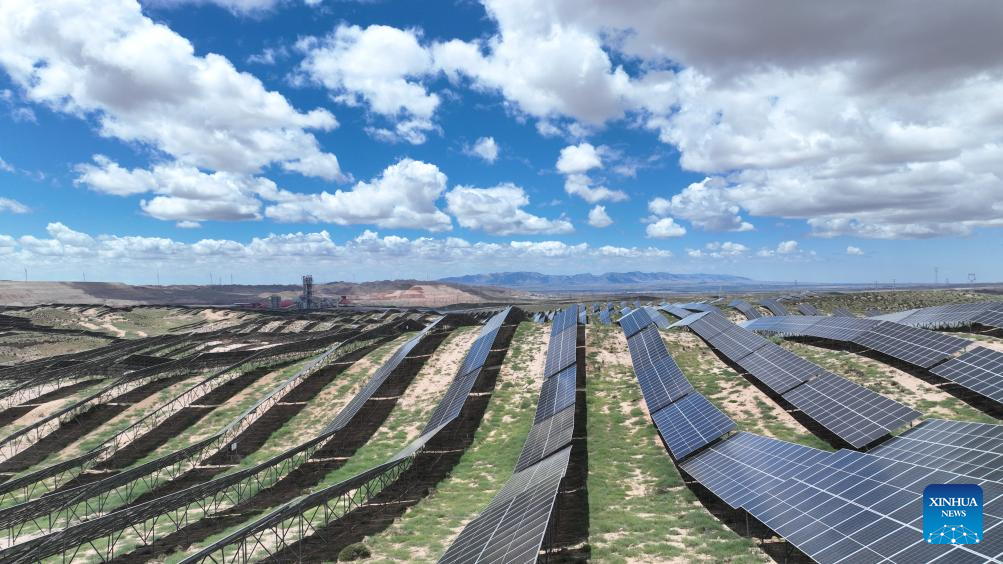
 0 Comment(s)
0 Comment(s) Print
Print E-mail China.org.cn, August 16, 2024
E-mail China.org.cn, August 16, 2024
This photo taken on July 29, 2023 shows a view of a photovoltaic power station in Wuzhong city, northwest China's Ningxia Hui autonomous region. [Photo/Xinhua]
China celebrated its second National Ecology Day on Aug. 15, with this year's theme being "accelerating the comprehensive green transformation of economic and social development." This event aims to foster societal consensus when it comes to green, low-carbon development, and underscores China's unwavering commitment to a sustainable future.
Recently, China released a set of new guidelines, outlining a clearer and structured roadmap for ramping up a green transition in all aspects of economic and social development.
From regional development and industrial structure to transportation and technological innovation, the guidelines offer specific deployment strategies, highlighting China's significant efforts toward advancing high-quality development.
Historic strides have been made in the country's green, low-carbon development since the 18th National Congress of the Communist Party of China (CPC). By the end of June 2024, renewable energy installations reached 1.65 billion kilowatts, accounting for 53.8% of the total. The automotive sector also reflects this rapid shift, where new energy passenger vehicles achieved a historic market penetration rate of 51.1% in July, surpassing traditional fuel-powered vehicles for the first time.
These achievements are supported by a robust industrial system with the world's largest and most comprehensive new energy industry chain.
Resource efficiency has also seen substantial improvements. From 2012 to 2023, the energy consumption and carbon emission per unit of GDP decreased by more than 26% and 35%, respectively, contributing to the visible enhancement of environmental quality — bluer skies, greener mountains and clearer waters.
As the world's second-largest economy with over 1.4 billion people, China offers crucial solutions for advancing global green development with achievements that extend beyond the country's borders. According to the International Energy Agency, China contributed to over half of the world's 510 gigawatts of new renewable energy capacity in 2023. Its wind and photovoltaic products have also been exported to more than 200 countries and regions, helping developing nations access clean, reliable and affordable energy.

Photo taken on May 31, 2024 shows Chinese electric vehicles in Changzhou, east China's Jiangsu province. [Photo by Wang Yiming/China.org.cn]
Despite these contributions, China has faced unwarranted criticism and pushback from certain countries which hype so-called "overcapacity" in an attempt to stifle the growth of its new energy industries. Such short-sighted narrative and smear ignore the pressing global demand for green initiatives and undermine collective efforts toward sustainable development.
At a time when the global green transition faces complex challenges, such as the politicization of climate issues and escalating green trade barriers, China remains steadfast in its commitment to green, low-carbon development.
The country has made significant arrangements during the third plenary session of the 20th CPC Central Committee to accelerate a comprehensive green transformation. The release of new guidelines has provided a clear roadmap and robust policy support for this process.
These guidelines also propose a visionary role for China in "leading the global green transition process." By detailing concepts, approaches, domains and goals for international participation, China reaffirms its dedication to contributing wisdom and strength to building a community with a shared future for mankind.
China's practices in strategic planning, policy design, technological research, resource allocation and social mobilization not only advance its own green transformation but also serve as valuable models for other nations striving for energy-efficient, low-carbon transitions. With resolute steps and a steadfast vision, China is poised to drive even greater achievements in the global green transformation, making profound and lasting contributions to sustainable development worldwide.